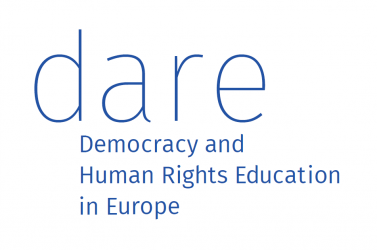- Outcome of the DARE Focus Meeting “Citizenship Reloaded: The Demand for Active Citizenship in Europe and its Implications for Education for Democratic Citizenship and Human Rights Education (EDC/HRE)”
- Vilnius/Lithuania, July 1-3, 2010
- Stakeholders from 16 European countries assessed the interrelation of EDC/HR and Active Citizenship within the context of Lifelong Learning.
1. Education for Democratic Citizenship and Human Rights Education must be integral parts of all future European Lifelong Learning policies and activities.
Education for Democratic Citizenship and Human Rights Education (EDC/HRE) are the founding principles of active citizenship. They connect the spheres of individual identity and civil society by bringing in the dimension of democratic values. These democratic values are the link to social cohesion in Europe. Active citizenship is an integral part of any education. Within the development of a future Lifelong Learning programme, the EU needs to refer to the special importance of learning about Human Rights and Democratic Citizenship for
a cohesive and prosperous Europe.
As part of the public discourse, active citizenship refers not only to political decision making in democratic societies, but aims to support debate within a society. Legal aspects of citizenship are important but Active Citizenship in Lifelong Learning is a much broader concept than a just legal definition of single rights and duties. Within the EU context promoting active citizenship
cannot be reduced to promoting Europe or selected voting rights. A concept of Active Citizenship Education would be of strong support to the EU´s future strategy, as it is related to all areas of life and is of crucial importance for a cohesive and prosperous Europe.
2. In light of this moving “citizenship” as policy issue from the Directorate General for Education and Culture (DG EAC) to the Directorate General for Communication (DG COMM) within the European Commission should be reconsidered.
Moving “citizenship” issues from the Directorate General for Education and Culture (DG EAC) to the Directorate General for Communication (DG COMM) represents a move from a policy DG to a general services DG. This risks forfeiting educational knowledge and losing educational providers as the sources of basic skills education. Furthermore, it poses a risk to social cohesion in a future EU strategy.
It should be especially emphasized that the non-formal educational sector within the field of Lifelong Learning is the educational field where the EU through European funding programs has the biggest impact. The European Commission is thus urgently asked to communicate to what extent the educational goals of Democratic Citizenship and Human Rights as guiding
principles of Active Citizenship will be further addressed in the Lifelong Learning program.
3. Adult Education in a civil society context deserves higher recognition as it has an enormous potential to include learners with limited access to education.
Increasing participation in adult learning is a common goal addressed especially by the EU Grundtvig programme. Yet the gap between the resources of the EU Lifelong Learning program provided to citizens with higher education and those without it is set to become wider,
which poses a threat to social cohesion.
The EU stresses the importance of Lifelong Learning and thus the continuous education of adults. It thus seems vital to provide more funds and support where and whenever possible to ensure that this sort of learning can take place. People with higher education are not those at risk of social exclusion in the EU. Therefore, it is of importance to allocate more funds to adult
learning programs such as Grundtvig, which addresses all learners.
European learners also need different programmes and trainings. It is up to NGOs to provide this diversity of learning options. Non-formal approaches open up new perspectives for learners, and as such they should gain higher recognition within EU policies. Furthermore, they should not be reduced solely to their contribution to the labour market.
We should not look for a uniform approach in EDC/HRE. Especially in times where our school systems face structural overload from ongoing reforms, we ask that the political sector in Europe put more trust and more support in the non-governmental sector.
4. All bodies within the EU are asked to operate in a future Lifelong Learning Programme (Erasmus+) with all Lifelong Learning key competences on the same level.
Especially those competences which for now lack indicators may contribute most to a cohesive and prosperous Europe. In the future Lifelong Learning Programme the EU is thus asked to answer the needs of how to further operate with the LLL key competences of “social and civic skills”, the “learning to learn” competences and the key competences of “cultural awareness and expression”.
All bodies within the European Union are asked to support the development of monitoring and evaluation mechanisms in form of a national EDC/HRE policy review.
The European Union is asked to adopt the Council of Europe Charter on Education for Democratic Citizenship and Human Rights Education when joining the European Convention on Human Rights. Even if non-binding, the Charter sets a standard that the EU should uphold.
5. The European Commission is urgently asked to pay more attention to the strategic implementation of Education for Active Citizenship within the development of all future strategies for Lifelong Learning.
The role of NGOs in education needs to be better addressed by the EC.
Especially the coming Hungarian Presidency is asked to push the Council of Ministers to adopt a Council Conclusion an Education for Active Citizenship.
The European Parliament is asked to finally make the DROI Committee to a full Committee to be able to monitor and substantially contribute to all policies related to fundamental rights and citizenship within the EU.
The Member States should be clearer about their role within the EU and the Council of Europe. Especially in terms of Education for Democratic Citizenship and Human Rights Education, we as providers of education have the impression that the left hand does not know what the right hand is doing.
The Member States of the EU and the COE are asked to implement policies supporting Education for Active Citizenship. We strongly support the EU Fundamental Rights Agency’s (FRA) analysis that Human Rights Education needs to be paid more attention especially within the logic of the funding
programs of the European Union.
Nevertheless the Fundamental Rights Agency is urgently asked to build its Human Rights Education strategy on the foundation of the work done by the Council of Europe. The FRA is especially asked to pay more attention on the interrelation of the fields of Education for Democratic Citizenship and Human Rights Education and the level of quality that the field has achieved within the COE by gathering under one roof.
6. Recommendations to NGOs
- NGOs as providers of non-formal education should better monitor the EDC/HRE policies of EU Member States within the EU and Council of Europe contexts.
- NGOs should follow up and review on the national level the work of the bodies responsible for the implementation of the World Program for Human Rights Education.
- NGOs should engage on the national level with the bodies/persons working with the COE in the EDC/HRE context. NGOs especially should try to follow up on the Council of Europe Charter on Education for Democratic Citizenship and Human Rights Education as it promotes their importance within any system of education. EDC/HRE providers should concentrate on equal access for learners. Non-formal education especially enables the addressing of non- academic audiences; NGOs should therefore be keen to set their focus on targeting people outside the academic sphere.
- DARE should partner with the Fundamental Rights Agency. Legitimized through its strong membership base, DARE should do more than just follow up on the agency’s policies.

